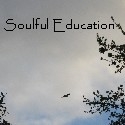Winter has finally arrived! We woke yesterday to a world blanketed in glorious wet, white snow, and the kids and I were eager to run outside and greet it.
Every winter I'm reminded how a landscape of new-fallen snow is like a huge blank chalkboard. Virginal, unmarred, fresh from experience, a lot like our children. They head out the door decked in their woolies and dance the dance of tactile experience, each footprint and snow angel marking the landscape in their wake, as if their bodies were chalk dancing upon the chalkboard-- ever moving, ever marking, ever experiencing. Onward.
How so representational of their experience of life! Starting out fresh and new like a clean slate, and as they move forward in experience and age the landscape gets marred, the experiences become less fresh, and they simply begin to know things. They learn how squishy the snow feels under their boots, and they learn the best way to roll a ball to make a snowman. And as they go along each footprint and trail and snow angel begins to lose the fresh, experiential appeal. Like you and I, they slowly begin to take it for granted. Been there, done that. And like us they forget how that experiential knowledge was first formed-- by experience. They even being to say, "Oh, everyone knows that."
We adults are notorious for this kind of thinking. We assume so many things, especially, that others can read our minds. That others know why we react the way we do. We easily fall into making assumptions that others must share this same knowledge, but how can they if knowledge is acquired by experience? And each experience, however similar, has its own nuances and particulars. Even siblings, raised in the same household by the same parents, grow up with a different experience, dependent upon how that experience melded and was interpretted by their own temperament. Our experiences shape us, make us who we are, and because we are each our own person, the knowledge we own will never be truly shared by another.
When it comes to children, adults oftentimes fall into the trap of assuming that children have all kinds of knowledge that they simply don't yet have. We've all said things like, "You should have known better." It's easy to assume they should have known better, that had they been thinking clearly (i.e. like us and with our background of worldly experience), that they wouldn't have done x,y, or z. But children aren't us. They are not small adults. They are newly forming, and don't have our experience. That's why human children are born to parents and not hatched and left to their own devices. It's our jobs to show them the way, to help them make decisions. It's why we biologically can't reproduce until we've lived long enough to have some life experience, and with this experience we can guide our children in so many ways-- from how to build a snowman to how to interact with others in the world.
Yesterday Sunburst played in the snow for the very first time with other kids. She lost her gloves last week, so she borrowed her dad's big floppy ones, and went out to play. The kids happily made snowmen, angels, snow tracks, and tossed a few snowballs. All was well and good until Sunburst, with Moonshine in tow, came back to the house in a puddle of tears. It seems that one of her snowballs hit the neighbors' daughter in the face, and the father of the child burst from the house and gave Sunburst what for. Sunburst tried to explain that she wasn't aiming for her friend's face, but tells me the father told her in a very angry voice that because he witnessed her throwing it, he believed that her intentions were completely malicious in nature. In other words, he thinks my eight-year-old daughter is a bad kid.
He didn't bother to stop and tell her why it was dangerous to hit someone in the face with a snowball. He didn't bother to ask if she had ever played at throwing snowballs at someone who wasn't over five feet tall before. He didn't bother to notice that maybe her "two-fisted hand of snow" was because she was wearing her dad's big, floppy gloves. He didn't even bother to consider any previous knowledge of my child playing with his, and all the kindness that has passed between the two of them. He tossed all that aside and just assumed that she had his experience of growing up in Minnesota and knowing kids who had damaged eyes as a result of taking a snowball in the face.
It's been a long and hard week over here with Kitty Bill's dangerously exploratory antics and his successively getting terribly ill, several nights of no sleep, a death in the family, and the stress of preparing for the holidays and preparing to move overseas all at once, and then my usually joyful daughter appearing at the door crumpled. This father was the last straw in my otherwise awfully experiential week. I marched my crying daughter over there, and in not so many kind words, asked him to explain his reactionary behavior to Sunburst. Luckily he slowed down long enough to accept Sunburst's apology and share his experiential knowledge of the dangers of snowballs with her. We had to go home and discuss what a "torn cornea" was, because that vocabulary wasn't yet a part of her experience, but otherwise, I think it went well. Though to be honest, my irritation still lingers.
Whenever any of my kids have an issue, whether it's with another child or with another adult, I encourage them to work it out. It often does a world of good to simply tell someone, "It hurt my feelings when you did that." And as Moonshine found out last week at her ice skating class, sometimes the only thing it does is put the ball in someone else's court. Even if they are unreceptive to your feelings, at least you shared them. This is how we gain experience-- from speaking our peace and letting others speak theirs. If we hadn't stood there and looked the neighbor dad in the eye and let him know that we had a problem with the way he handled the situation, we wouldn't have heard his stories about Minnesota, and Sunburst wouldn't have gained any other experiential knowledge than: that angry dad thinks I'm a mean, bad kid.
Kids cannot be "bad." Surely, they can act dangerously. Carelessly. Especially kids who tend toward choleric temperaments-- they are all body and action, and sometimes they get carried away. Sometimes, in the heat of the moment, they take things too far. But that's what kids are designed to do-- to cross lines. To push boundaries. To explore their limits (and ours!) That's how children learn, and by guiding them and sharing our adult experiential knowledge with them, hopefully they can learn more easily.
There has been a lot of talk lately within our local homeschooling group about "bad kids." Certainly, there is a lot of undesirable behavior. Wreckless behavior, even. But innate badness? In eight-year-olds? This is a common misconception, but I don't believe it. I think this is just a lack of experience and a lack of understanding about how knowledge is gained. Perhaps a lack of guidance, even. But not because a child is truly bad.
Somewhere, hidden deeply within the bylaws of our local homeschooling group, is the idea that if you see a child misbehaving at an event, you should step in-- regardless of whether the child is yours or not. And once in a while people do, some with success and others with certain disaster if they forget that children are still learning. You can't reprimand or redirect a child without reason, or your efforts are meaningless. If you blast them without guidance, you are no more than the harsh winter wind drifting the children like snow and pushing them farther away from any chance at meaningful experience.
To truly understand children, you have to walk out into that fresh unmarred landscape and pretend you haven't been there before. Make some footprints. Grab a stick and make a trail. Let it all be new. Everyday. Every second. Take nothing for granted. Lay down and let the cold, squishiness of the snow envelope you. And then step back and behold what you have made.
Sunday, December 16, 2007
Subscribe to:
Posts (Atom)






